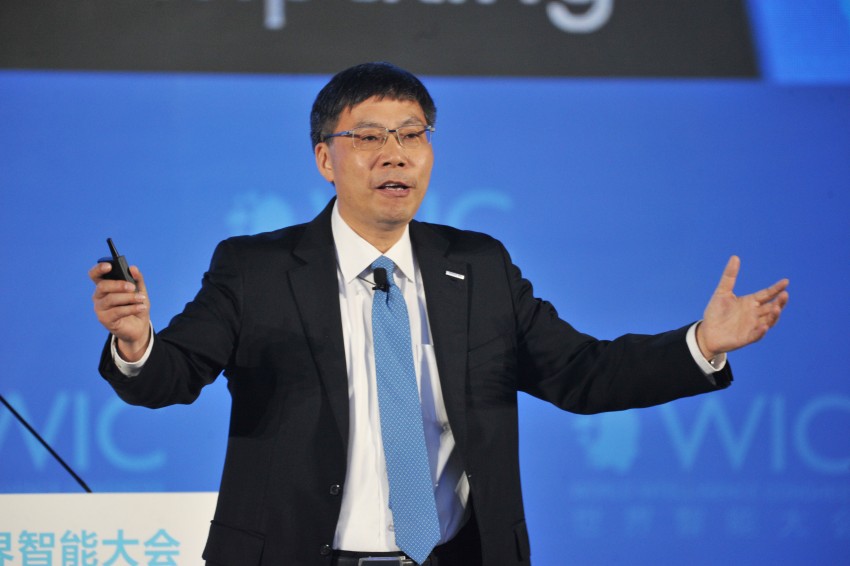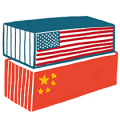

US borrows from Beijing’s playbook to decouple the Internet from China
TOP STORY: US borrows from Beijing’s playbook to decouple the Internet from China
The United States’ campaign against Chinese technology companies has stepped up a notch or two in recent weeks with new measures that, while certainly not aimed at censoring information, reflect elements of China’s approach to internet governance, one where cyberspace is tightly controlled by the state.
On August 5, US Secretary of State Mike Pompeo announced a significant expansion of the Clean Network program, an “all-of-government, enduring strategy built on a coalition of trusted partners”. It aims for telecoms networks, apps, app stores, cloud systems and undersea cables to be “clean” of any Chinese presence if they connect to US networks or transmit US data. Shortly afterwards, President Donald Trump issued executive orders declaring a “national emergency” around the Chinese social media apps TikTok and WeChat, banning transactions with the apps’ parent companies ByteDance and Tencent.
The Clean Network program has been presented by the Trump administration as necessary to protect business secrets, the privacy of American citizens, and national security from Chinese Communist Party (CCP) intrusions. Likewise, the moves against TikTok and WeChat are motivated by concerns that the apps provide the CCP with tools to harvest American citizens’ data and spread censorship and disinformation, potentially leading to espionage, manipulation, and even political interference.
Chinese media reported extensively on the proposed ban, decrying it as an arbitrary act that violates US law and is solely aimed at securing the United States’ technological superiority. The Global Times called it an “atrocity against net freedom”. TikTok itself denies handing over data and is reportedly taking legal action to challenge the measures.
The irony, however, is that many foreign apps are blocked in China, including TikTok itself, which is the international version of the highly successful domestic app Douyin. ByteDance is in talks with Microsoft over a potential purchase of TikTok, which would allow the app to remain on US-owned platformsif a deal was reached before Trump’s September 15 deadline. For Tencent, the economic impact of a WeChat ban is likely to be negligible as long as its main business - gaming - remains untouched.
Where the ban will mainly be felt is by the Chinese diaspora and the 19 million daily active users of WeChat in the United States. Tourists, students and expats all use the platform for social communication and to maintain ties to friends and family in China. Meanwhile the Clean Network program is likely to be a major blow to the global ambitions of Chinese Internet technology companies. For example, smartphone makers like Huawei, Oppo and Xiaomi could soon be forced to delete US apps from their stores.
MERICS analysis: “The concerns with these apps are very real, but the justifications given by the US administration for its radical approach are questionable: instead of addressing critical issues like data privacy, network security and platform regulation through holistic policies, the US government is choosing to target individual companies based on their country of origin," says MERICS analyst Rebecca Arcesati.
Media coverage and sources:
- US State Department: The Clean Network
-
US State Department: Secretary of State Mike Pompeo’s announcement
-
The Guardian: TikTok censorship
-
Forbes: Comparison with data collection by US social media companies
-
TechCrunch: French data watchdog investigates TikTok
-
Global Times: Editorial condemning the ban
-
Lowy Institute: Cyber sovereignty cuts both ways
-
The Verge: Analysis of legal questions behind the bans
-
The Citizen Lab: WeChat censors communications among non-China-registered accounts
Beijing boosts support for chip industry
The facts: Measures announced by the Chinese government to support the information technology industry have had an immediate effect. Just one day after the release of a document outlining policies for the domestic software and integrated circuit (IC) industries, stocks in Chinese IC firms skyrocketed. The policies, which were released by the State Council on August 4, include measures on tax and support for market application as well as research and development. They apply to all companies established in China, including foreign-owned enterprises. As an example, qualified IC projects and companies using a 28-nanometer process technology or lower may be exempt from corporate income tax for up to ten years. The Chinese government is also encouraging companies to go public in order to raise funds at home and abroad, and to intensify cooperation with research institutions overseas.
What to watch: More support measures for the domestic IC industry at all levels of government as well as an increase in private capital influx are expected to kick in soon. Since Chinese telecoms giant Huawei is reportedly running out of its advanced Kirin processor chips thanks to US sanctions, the timing of the new policy could not be better.
MERICS analysis: These new measures are a follow-up to policies released in 2011. The Chinese government has supported the IC and software industries for decades. It set ambitious goals: by 2030, chips “made in China” should serve 75 percent of the global market and 80 percent of the Chinese market. To achieve this, however, seems well beyond reach. Progress to date is lagging behind expectations.
Media coverage and sources:
- State Council (CN): Policy document outlining the support measures
-
Caixin Global: Stocks surge on supportive policy
High-ranking US visit to Taiwan
The facts: Amid heightened tensions between the US and China, Washington has sent the most high-ranking delegation to Taiwan since 1979, when it broke off official ties with Taipei. US secretary of health and human services Alex Azar met President Tsai Ing-wen this week and praised Taiwan’s successful Covid-19 response as well as the country’s friendly relations with the United States. The response from China was forthright. The foreign ministry condemned the visit and, in a warning shot, sent fighter jets to the Taiwan Strait.
What to watch out for: A larger focus on Taiwan could cause a stronger response from Beijing, since it considers Taiwan as one of its core interests. At the same time, Taiwanese officials are worried about the potential use of Taiwan by the US only as a tool to challenge China. The US government’s approval of arms sales to Taiwan in May and an increase in Chinese military activity across the strait are all actions that point in this direction.
MERICS analysis: For Taiwan, the visit and its focus on Taiwan’s successful response to Covid-19 is important not only because it is excluded from the WHO but also because it is an unusually strong show of support from the United States. However, it comes at a time when the Trump administration is taking on every possible issue to confront Beijing.
Media coverage and sources:
Hong Kong applies National Security Law with rigor
The facts: Six weeks after the controversial National Security Law came into force, Hong Kong police have arrested prominent supporters of the pro-democracy movement. Earlier this week they arrested media entrepreneur Jimmy Lai and the well-known activist Agnes Chow, among others. Both were released on bail. The editorial offices of Lai’s pro-democracy newspaper Apple Daily were searched. The police policy of allowing only “trustworthy” media to report on the spot attracted strong criticism. Twelve pro-democracy candidates were excluded from the Hong Kong Parliament elections. These were postponed until next year, according to the official explanation, because of the coronavirus pandemic. In response, the US imposed sanctions on several political representatives from mainland China and Hong Kong, including Chief Executive Carrie Lam.
What to watch: The 15 documented arrests so far are likely to be followed by many more. Hong Kong police published a wanted list of activists at the end of July. Among them is a US citizen living in the United States. This demonstrates clearly the extraterritorial scope of the law, which also threatens penalties for offences committed outside Hong Kong.
MERICS analysis: “When the law first came into force, Hong Kong Chief Executive Carrie Lam and Beijing were still claiming that it would only affect an ‘extremely small number’ of people. Just six weeks later, this claim has already been refuted. If only those Hong Kongers whose opinions are in line with Beijing’s can express their views and run for political office, it will affect the whole of Hong Kong politics and society,” says MERICS expert Katja Drinhausen.
Media coverage and sources:
- The Guardian: Arrest of Jimmy Lai is attack on press freedom
-
Hong Kong Bar Association: Effect of postponing the election on basic rights
-
Freedom House: Extraterritorial reach of Hong Kong’s new National Security Law
-
Washington Post: US sanctions against Hong Kong Chief Carrie Lam
METRIX

Central China has experienced some of the worst flooding in living memory due to near record rainfalls since June. The banks of the Yangtze River and its tributaries have burst in many places causing over 144 billion yuan (20.5 billion USD) in economic losses, according to official statistics. Fewer people have been killed than in previous floods in China – 158 to date – but 3.6 million have been displaced from their homes. (Source: Sixthtone.com)
REVIEW: Superpower Interrupted: The Chinese History of the World
Following China’s story from its origins to the present day, Michael Schuman’s organizing theme is “the Chinese history of the world”, introducing readers to a civilization that evolved completely separately from Europe and to the distinct worldview it developed.
The narrative relies extensively on quotes, from well-known personages like Sima Qian (“China’s Herodotus”) and the fin de siècle intellectual Liang Qichao to more anonymous figures. Greater diversity of voices from later centuries might have balanced the narrative’s bias towards the powerful and representatives of “high culture”; only two females, the Empress Dowager Cixi and Zhou Enlai’s wife, Deng Yingchao, are given voice. The perspectives of foreign peoples interacting with China are also largely unheard. This perhaps reflects the author’s reliance on secondary sources.
The narrative focus on China’s external relations sometimes leads Schuman to gloss over or omit significant episodes in Chinese history. Notably, there is no mention of the 19th century Taiping rebellion, which left 20 million dead and re-shaped China as much as did European interventions. In this respect, the book slips toward the Eurocentric historiography that it generally tries to counter-balance.
Schuman achieves a sweeping overview of the influences that have shaped the perspective of Chinese elites on the outside world across the millennia. But his conclusion, which casts today’s PRC as a reincarnation of Imperial China, is somewhat disappointing. The book fails to probe what the loss of that “civilizational power” which once defined China’s place in the world means for contemporary international politics. Overall Superpower Interrupted is a readable introduction to Chinese history, though with limited depth.
Review by John Lee, Senior Analyst, MERICS
VIS-À-VIS
Wang Weiluo on China’s worst flooding in decades: “The damage floods do is growing”
Annual floods in China have already cost 158 lives, made 3.8 million people homeless and caused 144 billion yuan (17.5 billion euros) in economic damage, as the government reported at the end of July. Germany-based land-use expert Wang Weiluo last month even warned of the risk the Three Gorges Dam could collapse as a result of the water levels.
China is battling widespread flooding – some media have even talked about “the flood of the century”. How did it come about?
We currently don’t have comprehensive, transparent and verifiable information about this year’s flooding or about the damage it has caused. Most reports have come via social media. The situation is serious, but it is by no means the flood of the century. Water levels in Wuhan, for example, reached 28.77 meters above sea level on 12 July, which is lower than the 29.73 meters seen in 1954, the 29.43 meters seen in 1998 and the 28.89 meters seen in 1999. But the economic damage is much greater in 2020 than in the years before.
The problem is that for 70 years China has been focusing on dam construction as an instrument of water management and flood prevention. In 1949, there were about twenty dams and reservoirs in China. Today there are 98,000 dams and reservoirs in the country, more than half of which – some 52,000 – are in the Yangtze region. After the National People's Congress approved the Three Gorges Dam in 1992, hydroelectric power generation has grown rapidly under the banner of flood control. More and more wetlands, floodplains and lakes have been designated for the construction of housing and industry. Rivers have been narrowed and lake areas reduced. As a result, space for water has become increasingly scarce. It was believed that dams and reservoirs would prevent flooding. German technologies for flood protection – like those mobile metal barriers known from Cologne – are widespread in China. But new ideas like “living with floods”, “renaturalizing rivers”, or “giving water more space” aren’t.
There have been some very gloomy warnings about the course of the flood. What are the worst and the best things that could happen?
China’s economic reforms saw the rights to use dams and reservoirs privatized to relieve public finances. In the event of a flood, there is now a conflict between the economic interests of those with use rights and the public interest. Economic uses – electricity generation, water supply and irrigation – require the reservoirs to hold a lot of water. But in the event of a flood, the public interest requires the reservoirs to be emptied. Given the poor construction quality of many dams – including the Three Gorges Dam – the central government and many local governments are worried about dams failing.
So, the following priorities have emerged: first, dam safety; second, economic uses, directly tied to the interests of those with use rights; and only in third place, flood protection. As a result, events often unfold as follows. The industrial water users store as much water as possible, not least in the name of flood protection. Then the authorities or the users discover that the water volumes are endangering the dam. The authorities then order water to be drained – hopefully still in good time. In August 1963, more than 300 dams in Hebei Province failed – and the resulting damage has remained a state secret. In 1975, 62 dams broke in Henan province and 240,000 people died.
Let's go back to the reasons for the flooding. Given the Chinese government’s course, will it be able to tackle the root causes in a meaningful way?
The Chinese government has introduced a new system to fight flooding. It is based on personal responsibility – one official is in charge of every river, another of every river section, yet another of every lake. In addition, there are three people responsible for each dam and reservoir – the deputy head of the government that is responsible, the head of the government's water management department and the owner of the rights to use the dam. The names of these three people are published on the internet. President Xi Jinping has recently emphasized that these people are personally responsible and must help on the front lines. Secret checks are being undertaken to make sure they are obeying Xi's orders. Inspections of this type were effective during the coronavirus epidemic and Xi would like to see similar successes in flood prevention.
When the Communist Party came to power 70 years ago, Mao declared war on the Yangtze and other rivers as a prelude to controlling the water they carry. The technical means came with the dam-construction techniques introduced by the Soviet Union and the investments were immense. But floods are now ever more frequent and the damage they do is growing. As the Chinese government doesn’t tolerate any public discussion of water-management policy, don’t expect it to change course any time soon.
The interview was conducted by Gerrit Wiesmann.
PROFILE: Inspur: Leading the charge toward technology independence
If Inspur illustrates one thing, it is China’s determination to become self-sufficient in digital technology. Inspur is China’s undisputed leader in the market for servers and number three in the world. The company is in rude health: while the overall server market in China shrunk by 31 percent in the first quarter of 2020, Inspur extended its relative share by 7 to 39 percent.
Inspur’s strategic importance has attracted the United States’ attention. In June it was one of 20 companies included in a list published by the Pentagon of Chinese enterprises with ties to the People’s Liberation Army. As a result, Intel briefly stopped supplying Inspur with chips. China’s State Council reacted this month, issuing policies to promote the development of the chip and server industry. Beijing clearly wants to accelerate technological independence, and Inspur is part of that plan.
Founded as Langchao (浪潮) in Shandong, the company produced its first PC in 1983 and in 1990 developed the first Chinese character pager in the world. Through the 2000s it grew nationwide and attracted interest from abroad with a 20-million-dollar investment from Microsoft in 2005. It has since expanded into cloud computing, AI and industrial software and landed a series of global strategic partnerships with SAP, Cisco and IBM. Today it provides IT products and services to governments and enterprises in over 100 countries and regions, although China remains its main market.
Its party-ties are certainly very visible: CEO Sun Pishu, who has led the transformation of the company to a cloud computing and big data operator, is CCP Party Secretary, and Deputy General Manager Ma Zhiwei has said he sees Inspur as an important piece in the substitution of foreign technology with Chinese innovation. In case the employees haven’t got the message yet, written in bold letters on the walls of the production line in Zhengzhou, Henan, are the words: “Make Domestic Products”.
Media coverage and sources:
-
Technode: Intel resumes shipments to Inspur
-
World Economic Forum: Profile of CEO Sun Pishu
MERICS China Digest
MERICS’ Top 3
-
Himalaya frontier: India and China build along border
-
New order: China creates global industrial champions
International relations
-
Delisted from US-Exchanges: Chinese companies that do not meet US accounting standards
-
US-China: Trump sanctions Xinjiang Production and Construction Corps (XPCC)
-
Iran’s pact with China: Bad news for the west
Politics, society and media
-
Court apologizes: Man is freed after 27 years in prison
-
Concern over erosion of rights: New plan targets China's most defiant homeowners
-
China‘s most popular politician in Hong Kong: Zhu Rongji
Economics, finance and technology
-
Number one: China passes US as world's top researcher
-
Foreign investment: China improves foreign investor access
-
Plus eight percent: Car sales in China rose significantly in July
-
TikTok: Apple and Google stay silent

